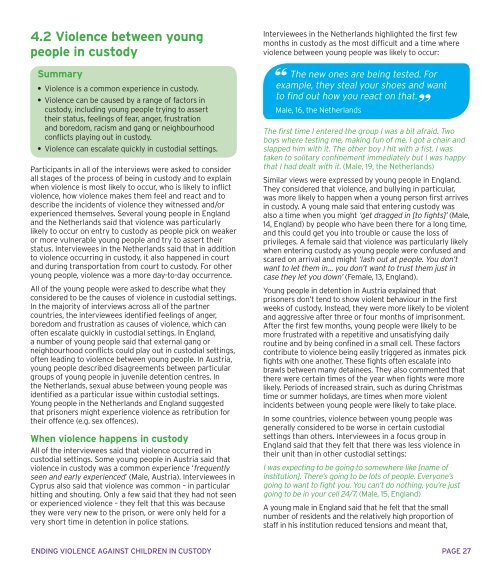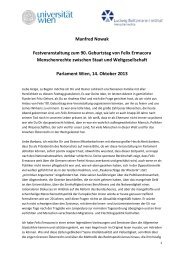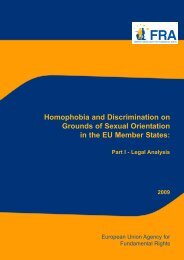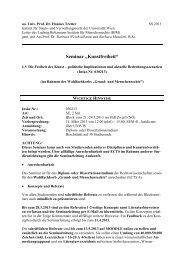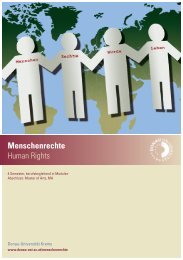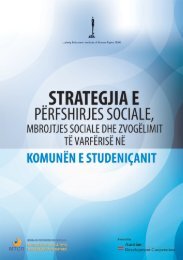speaking freely - 404 Page not found
speaking freely - 404 Page not found
speaking freely - 404 Page not found
Create successful ePaper yourself
Turn your PDF publications into a flip-book with our unique Google optimized e-Paper software.
4.2 Violence between young<br />
people in custody<br />
Summary<br />
• Violence is a common experience in custody.<br />
• Violence can be caused by a range of factors in<br />
custody, including young people trying to assert<br />
their status, feelings of fear, anger, frustration<br />
and boredom, racism and gang or neighbourhood<br />
conflicts playing out in custody.<br />
• Violence can escalate quickly in custodial settings.<br />
Participants in all of the interviews were asked to consider<br />
all stages of the process of being in custody and to explain<br />
when violence is most likely to occur, who is likely to inflict<br />
violence, how violence makes them feel and react and to<br />
describe the incidents of violence they witnessed and/or<br />
experienced themselves. Several young people in England<br />
and the Netherlands said that violence was particularly<br />
likely to occur on entry to custody as people pick on weaker<br />
or more vulnerable young people and try to assert their<br />
status. Interviewees in the Netherlands said that in addition<br />
to violence occurring in custody, it also happened in court<br />
and during transportation from court to custody. For other<br />
young people, violence was a more day-to-day occurrence.<br />
All of the young people were asked to describe what they<br />
considered to be the causes of violence in custodial settings.<br />
In the majority of interviews across all of the partner<br />
countries, the interviewees identified feelings of anger,<br />
boredom and frustration as causes of violence, which can<br />
often escalate quickly in custodial settings. In England,<br />
a number of young people said that external gang or<br />
neighbourhood conflicts could play out in custodial settings,<br />
often leading to violence between young people. In Austria,<br />
young people described disagreements between particular<br />
groups of young people in juvenile detention centres. In<br />
the Netherlands, sexual abuse between young people was<br />
identified as a particular issue within custodial settings.<br />
Young people in the Netherlands and England suggested<br />
that prisoners might experience violence as retribution for<br />
their offence (e.g. sex offences).<br />
When violence happens in custody<br />
All of the interviewees said that violence occurred in<br />
custodial settings. Some young people in Austria said that<br />
violence in custody was a common experience ‘frequently<br />
seen and early experienced’ (Male, Austria). Interviewees in<br />
Cyprus also said that violence was common – in particular<br />
hitting and shouting. Only a few said that they had <strong>not</strong> seen<br />
or experienced violence – they felt that this was because<br />
they were very new to the prison, or were only held for a<br />
very short time in detention in police stations.<br />
Interviewees in the Netherlands highlighted the first few<br />
months in custody as the most difficult and a time where<br />
violence between young people was likely to occur:<br />
The new ones are being tested. For<br />
example, they steal your shoes and want<br />
to find out how you react on that.<br />
Male, 16, the Netherlands<br />
The first time I entered the group I was a bit afraid. Two<br />
boys where testing me, making fun of me. I got a chair and<br />
slapped him with it. The other boy I hit with a fist. I was<br />
taken to solitary confinement immediately but I was happy<br />
that I had dealt with it. (Male, 19, the Netherlands)<br />
Similar views were expressed by young people in England.<br />
They considered that violence, and bullying in particular,<br />
was more likely to happen when a young person first arrives<br />
in custody. A young male said that entering custody was<br />
also a time when you might ‘get dragged in [to fights]’ (Male,<br />
14, England) by people who have been there for a long time,<br />
and this could get you into trouble or cause the loss of<br />
privileges. A female said that violence was particularly likely<br />
when entering custody as young people were confused and<br />
scared on arrival and might ‘lash out at people. You don’t<br />
want to let them in… you don’t want to trust them just in<br />
case they let you down’ (Female, 13, England).<br />
Young people in detention in Austria explained that<br />
prisoners don’t tend to show violent behaviour in the first<br />
weeks of custody. Instead, they were more likely to be violent<br />
and aggressive after three or four months of imprisonment.<br />
After the first few months, young people were likely to be<br />
more frustrated with a repetitive and unsatisfying daily<br />
routine and by being confined in a small cell. These factors<br />
contribute to violence being easily triggered as inmates pick<br />
fights with one a<strong>not</strong>her. These fights often escalate into<br />
brawls between many detainees. They also commented that<br />
there were certain times of the year when fights were more<br />
likely. Periods of increased strain, such as during Christmas<br />
time or summer holidays, are times when more violent<br />
incidents between young people were likely to take place.<br />
In some countries, violence between young people was<br />
generally considered to be worse in certain custodial<br />
settings than others. Interviewees in a focus group in<br />
England said that they felt that there was less violence in<br />
their unit than in other custodial settings:<br />
I was expecting to be going to somewhere like [name of<br />
institution]. There’s going to be lots of people. Everyone’s<br />
going to want to fight you. You can’t do <strong>not</strong>hing, you’re just<br />
going to be in your cell 24/7. (Male, 15, England)<br />
A young male in England said that he felt that the small<br />
number of residents and the relatively high proportion of<br />
staff in his institution reduced tensions and meant that,<br />
ENDING VIOLENCE AGAINST CHILDREN IN CUSTODY PAGE 27


